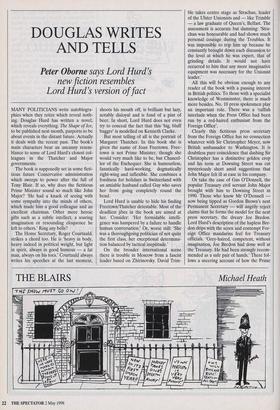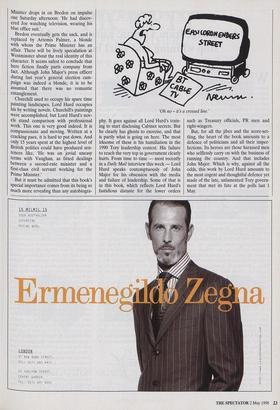DOUGLAS WRITES AND TELLS
Peter Oborne says Lord Hurd's new fiction resembles Lord Hurd's version of fact
MANY POLITICIANS write autobiogra- phies when they retire which reveal noth- ing. Douglas Hurd has written a novel, which reveals everything. The Shape of Ice, to be published next month, purports to be about events in the distant future. Actually it deals with the recent past. The book's main characters bear an uncanny resem- blance to some of Lord Hurd's closest col- leagues in the Thatcher and Major governments.
The book is supposedly set in some ficti- tious future Conservative administration which sweeps to power after the fall of Tony Blair. If so, why does the fictitious Prime Minister sound so much like John Major? 'He had a knack of seeing with some sympathy into the minds of others, which made him a good colleague and an excellent chairman. Other more heroic gifts such as a subtle intellect, a soaring imagination or resounding eloquence he left to others.' Ring any bells?
The Home Secretary, Roger Courtauld, strikes a chord too. He is 'heavy in body, heavy indeed in political weight, but light in spirit, always in good humour — a fat man, always on his toes.' Courtauld always writes his speeches at the last moment, shoots his mouth off, is brilliant but lazy, notably disloyal and is fond of a pint of beer. In short, Lord Hurd does not even try to conceal the fact that this 'big, bluff bugger' is modelled on Kenneth Clarke.
But most telling of all is the portrait of Margaret Thatcher. In this book she is given the name of Joan Freetown. Free- town is not Prime Minister, though she would very much like to be, but Chancel- lor of the Exchequer. She is humourless, fanatically hard-working, dogmatically right-wing and inflexible. She combines a fondness for holidays in Switzerland with an amiable husband called Guy who saves her from going completely round the bend.
Lord Hurd is unable to hide his finding Freetown/Thatcher detestable. Most of the deadliest jibes in the book are aimed at her. Consider: 'Her formidable intelli- gence was hampered by a failure to handle human conversation.' Or, worse still: 'She was a thoroughgoing politician of not quite the first class, her exceptional determina- tion balanced by tactical ineptitude.'
On the broader international scene there is trouble in Moscow from a fascist leader based on Zhirinovsky. David Trim- ble takes centre stage as Strachan, leader of the Ulster Unionists and — like Trimble — a law graduate of Queen's, Belfast. The assessment is accurate but damning: `Stra- chan was honourable and had shown much personal courage during the Troubles. It was impossible to trip him up because he constantly brought down each discussion to the level at which he was expert, that of grinding details. It would not have occurred to him that any more imaginative equipment was necessary for the Unionist leader.'
All this will be obvious enough to any reader of the book with a passing interest in British politics. To those with a specialist knowledge of Westminster, there is much more besides. No. 10 press spokesmen play an important role. There was a 'raffish interlude when the Press Office had been run by a red-haired enthusiast from the Foreign Office'.
Clearly this fictitious press secretary from the Foreign Office has no connection whatever with Sir Christopher Meyer, now British ambassador to Washington. It is doubtless pure coincidence that dashing Sir Christopher has a distinctive golden crop and his term at Downing Street was cut mysteriously short amid suggestions that John Major felt ill at ease in his company.
Or take the case of Gus O'Donnell, the popular Treasury civil servant John Major brought with him to Downing Street in 1990. Those who know Mr O'Donnell now being tipped as Gordon Brown's next Permanent Secretary — will angrily reject claims that he forms the model for the next press secretary, the dreary Joe Bredon. Lord Hurd's description of the hapless Bre- don drips with the scorn and contempt For- eign Office mandarins feel for Treasury officials. 'Grey-haired, competent, without imagination, Joe Bredon had done well at the Treasury. He had been strongly recom- mended as a safe pair of hands.' There fol- lows a sneering account of how the Prime Minister drops in on Bredon on impulse one Saturday afternoon: 'He had discov- ered Joe watching television, wearing his blue office suit.'
Bredon eventually gets the sack, and is replaced by Artemis Palmer, a blonde with whom the Prime Minister has an affair. There will be lively speculation at Westminster about the real identity of this character. It seems safest to conclude that here fiction finally parts company from fact. Although John Major's press officer during last year's general election cam- paign was indeed a blonde, it is to be assumed that there was no romantic entanglement.
Churchill used to occupy his spare time painting landscapes. Lord Hurd occupies his by writing novels. Churchill's paintings were accomplished, but Lord Hurd's nov- els stand comparison with professional work. This one is very good indeed. It is compassionate and moving. Written at a cracking pace, it is hard to put down. And only 15 years spent at the highest level of British politics could have produced sen- tences like, 'He was on jovial uneasy terms with Vaughan, as fitted dealings between a second-rate minister and a first-class civil servant working for the Prime Minister.'
But it must be admitted that this book's special importance comes from its being so much more revealing than any autobiogra- 'Oh no – it's a crossed line.'
phy. It goes against all Lord Hurd's train- ing to start disclosing Cabinet secrets. But he clearly has ghosts to exorcise, and that is partly what is going on here. The most irksome of these is his humiliation in the 1990 Tory leadership contest. His failure to reach the very top in government clearly hurts. From time to time — most recently in a Daily Mail interview this week — Lord Hurd speaks contemptuously of John Major for his obsession with the media and failure of leadership. Some of that is in this book, which reflects Lord Hurd's fastidious distaste for the lower orders such as Treasury officials, PR men and right-wingers.
But, for all the jibes and the score-set- tling, the heart of the book amounts to a defence of politicians and all their imper- fections. Its heroes are those harassed men who selflessly carry on with the business of running the country. And that includes John Major. Which is why, against all the odds, this work by Lord Hurd amounts to the most cogent and thoughtful defence yet made of the late, unlamented Tory govern- ment that met its fate at the polls last 1 May.



























































 Previous page
Previous page